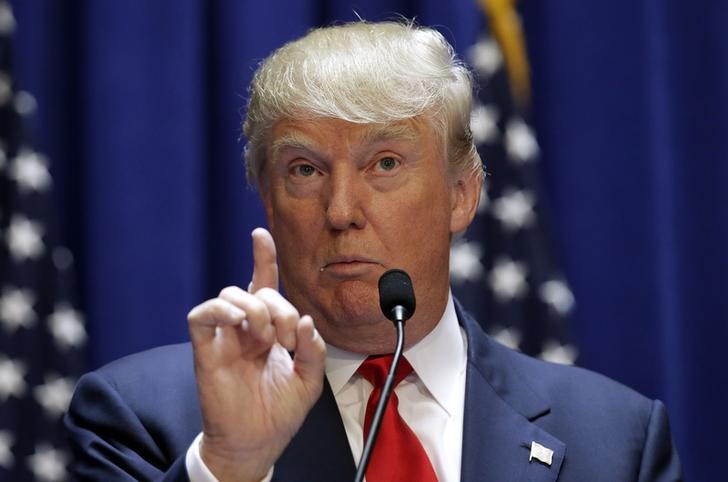(Bloomberg) -- The maker of Sylvania light bulbs wants to expand its U.S. manufacturing and add American jobs, just as Donald Trump advocates. But the president’s tariffs are getting in the way.
LEDVANCE LLC said proposed duties on imported LED components are putting at risk efforts to shift production from China to plants in Kentucky and Pennsylvania, states where a $10 million upgrade last year means bulbs can be made four times faster and shipped more quickly to Walmart (NYSE:WMT) Inc. and other customers that want U.S.-made goods.
The company is among hundreds of U.S. firms asking for relief from tariffs, which are meant to address a trade deficit with China and allegations of intellectual property theft. The White House says the economy is strong enough to absorb the impact of tariffs, and the long-term payoff will make the short-term pain of higher duties worthwhile.
Many businesses say the tariffs will increase their costs, forcing them to raise prices for consumers and even consider moving manufacturing offshore.
“The administration wants U.S. production, they want U.S. manufacturing, and in this particular case, they’re driving the exact opposite effect,” said Jennifer Dolin, regulatory affairs manager for Wilmington, Massachusetts-based LEDVANCE.
$200 Billion
Trump has imposed tariffs on $50 billion in Chinese imports and identified an additional $200 billion in goods targeted for duties of as much as 25 percent, ranging from chemicals and seafood to vacuums and bicycles. Those duties could take effect after a comment period ends Sept. 6.
Dolin and about 350 individuals from U.S. companies, trade associations and other entities testified this month in six days of hearings on the duties, with most asking that products be spared. But there’s little evidence that tensions between Washington and Beijing will ease up and allow the White House to scrap tariffs.
Speaking to reporters during his announcement Monday of a preliminary agreement with Mexico to replace the North American Free Trade Agreement, Trump said he is rejecting overtures from China to negotiate as he tries for a less “one-sided” trade policy. “It’s just not the right time to talk right now,” he said.
Reverse Ratio
LEDVANCE, which was sold last year to a Chinese investment consortium and has operations in more than 140 countries, makes Sylvania incandescent, halogen, fluorescent and LED light bulbs. The company produces about 30 percent of its LED bulbs in the U.S. and 70 percent in China. But after upgrading plants in St. Marys, Pennsylvania, and Versailles, Kentucky, it planned to reverse that ratio and more than double production in the fiscal year starting Oct. 1, Dolin said.
The company converted traditional production lines in the U.S. to make LED bulbs, preserving the jobs of 200 workers and adding 20 new posts. The two facilities and supporting distribution centers employ about 650, she said.
Components imported from China to make LED bulbs are among the $200 billion in goods targeted for duties, and those parts are mostly made in China with limited other options to obtain them, Dolin said. While the duties would add costs to U.S. production, there are no additional tariffs on finished bulbs imported from China, she said.
Increasing Costs
LEDVANCE is asking the administration to either remove the tariffs on the components, impose duties on imported bulbs, or both. The company’s U.S. factories could ramp up production if tariffs on imported bulbs boost demand for its American-made products, Dolin testified last week in Washington.
The company doesn’t think the administration intends to disadvantage U.S. manufacturing and just wants “a level playing field so that U.S. production is not more expensive than buying straight from China,” she said.
Some company executives also say Trump’s tariffs are increasing the cost of manufacturing in the U.S. But they’re reluctant to speak publicly because of the backlash firms such as Harley-Davidson Inc (NYSE:HOG). have received for moving some production overseas.
Trump has fired off angry tweets about the motorcycle manufacturer and even backed a boycott after the company announced in June it’s shifting some production to sidestep tariffs from the European Union in retaliation for Trump’s separate duties on steel and aluminum imports.
1,000 Jobs
Trump’s tariffs also could affect plans announced by China-based Wanhua Group to build a $1.2 billion chemical complex in Louisiana that the company estimates would create more than 1,000 jobs directly and indirectly in Louisiana, Texas and Pennsylvania.
The list of $200 billion in goods targeted for tariffs includes aniline, which the company plans to import from China to make methylenediphenyl diisocyanate, or MDI, James Newport, general manufacturing site manager for Wanhua Chemical US Operations LLC, testified last week. It’s a chemical used primarily for foam insulation for residential and commercial construction, he said.
Newport declined to discuss the status of the project, announced last year and expected to open by 2021, as well as what impact the tariffs may have. But the company has asked to have chemical feedstock products removed from the tariff list and said its investment plans achieve Trump’s goals of bringing manufacturing to the U.S. and addressing the trade gap with China.
“What we’re doing in our company is exactly what the administration is encouraging to happen,” Newport testified.
